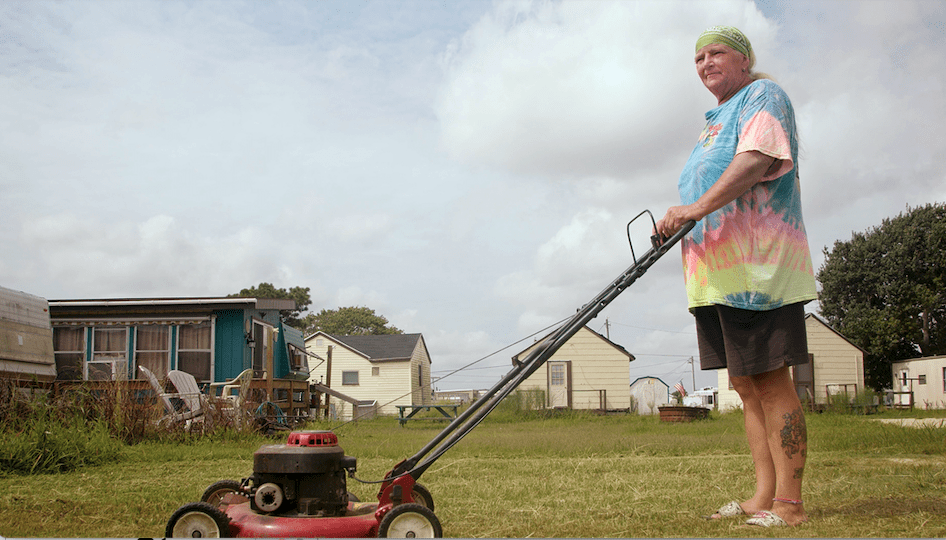In the 1960’s my maternal grandmother lived alone in a small trailer by the yacht basin in Carolina Beach, North Carolina. My mother often wished that we (a family of eight!) lived in a trailer too because, she said, it would be easier to keep clean. So I know about trailer park culture. But I never visited a mobile home community as idyllic as the one depicted in the sublime, poetic new documentary “Happy Campers,” which is now available for streaming on iTunes.
Chincoteague is Virginia’s only island resort and home to Chincoteague ponies, a feral breed of horses. The island is filled with small hotels, a wildlife refuge and a launch site where Antares rockets take off to resupply the International Space Station. Inlet View Recreation Vehicle Park was located on the southernmost tip of Chincoteague Island. If you look up old Trip Advisor reviews you’ll find lots of negative comments: “Even the Griswolds wouldn’t stay here!” But you’ll also read testimonials to how friendly and generous the longtime residents were. These happy campers readily admit that they are living in “the armpit” of the island.
The population of Inlet View is different than the rest of the American South: many of the residents are from Maryland, Delaware, Pennsylvania and New Jersey. (They are all white except for one black woman who, curiously, is not shown interacting with the others.) A common reason they all cite for spending their summers there is the ridiculously low cost of ownership–only $6,500 for a trailer. Most of them are retirees who spend each summer playing cards, drinking beer and wine, shooting off fireworks, throwing horse shoes and cracking jokes as they catch huge amounts of crabs in the bay, cooking and sharing them later in raucous communal feasts. (As a resident of Brooklyn, this openness seems heavenly. I recently emailed the neighbors in my four-floor walk-up to see if anyone wanted some of the leftover watermelon I couldn’t eat. No one responded. Maybe they feared I was trying to poison them?)
One bare-chested man laughs as he ignites one of those tin-ball cannons I haven’t thought about in years. There are no guns, just fishing gear and crab cages. One child explains to another that if you burn the marshmallows they are toasting in a fire they will taste better. A delightful little boy gives a prideful tour of the cubbyholes and other features of his beloved mobile summer home. But this will be the last summer these self-described “waterbillies” will get to party together. A developer has bought the property and is kicking them out of their utopic haven in order to build luxury resorts. “They want better people living here,” one waterbilly laments. “I’m sick that they are going to tear all of this down,” another one says.

This made me think of my own sorrow at age ten when the redirection of part of a highway (US-52 in Winston-Salem) forced some of my friends to move. I still remember their houses being miraculously trucked away atop huge wooden timbers. (See Godfrey Cheshires’s wonderful 2007 documentary “Moving Midway” for an example of such a type of home displacement, though a semi-voluntary one in his case.)
Indeed the cost of housing in this country has destroyed the 20th century dream of home ownership for the majority of Americans today. (In this interview the director talks about the “tiny house” phenomenon in response to this.) One resident angrily declares he will burn down what is left of his home before he moves rather than see the developers profit off of any of its contents.
Director Amy Nicholson is clearly familiar with the work of both Frederick Wiseman and Errol Morris, the latter of whose 1981 film “Vernon, Florida” is close in the spirit and tone of this doc. Her 2016 short film “Pickle” (available for rental or purchase here), a very funny portrait of her father and stepmother who rescue and raise a variety of animals which often suffer unfortunate ailments or are eaten by natural predators, is reminiscent of Morris’s 1978 landmark documentary “Gates of Heaven.” (It was included as an extra in the Criterion DVD edition of the film.)
Nicholson has great mentors and has developed her own unique approach to the documentary form, combining a photographic style inspired by the best of contemporary rural American photo essays with film editing and sound design and music that produces a wondrous flow that gives the work an almost dreamlike feeling. In one sequence, a long get together on a porch uses lap dissolves to cut to selected parts. The method (which I’ve never seen in a nonfiction film before) gives the scene an almost ghostlike appearance, as if we are witnessing a future memory of that afternoon. She uses overlapping nonverbal scenes with previously recorded dialogue and cuts to closeups of the cultural objects which fill the homes to create an extraordinarily rich time capsule.
Some minor caveats: these waterbillies never talk politics (even though U.S. flags are proudly displayed everywhere no one wears a MAGA cap) and there are no major domestic squabbles. Surely there must be some discord in this Arcadia besides their most topical crisis? (My own memories of vacations in nearby North Carolina are full of such loud disruptions.) But my dysfunctional family past should not prevent me from suspecting that harmony exists elsewhere. As Shakespeare wrote, “Let me not to the marriage of true minds/Admit impediments.” Even in what some would presume is Trumpville, the true villain is always capitalism. The real solution to the division in this country would be the return of community and this film’s masterful depiction of a genuine example of it made me cry tears of joy.
